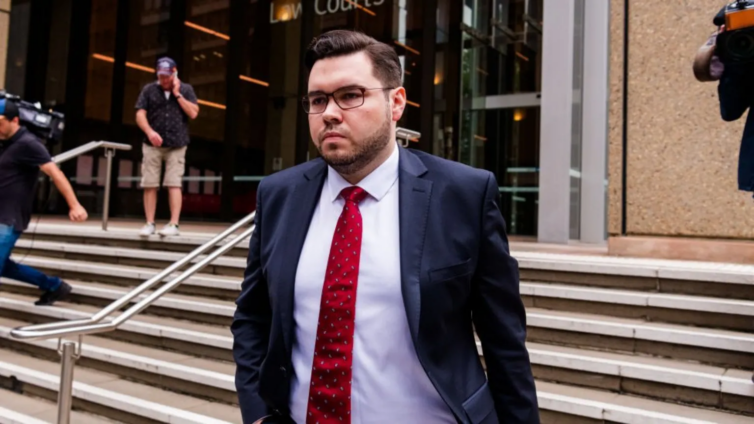Australia's most-watched TV network has denied accusations it paid for sex workers and illicit drugs to secure an interview with an alleged rapist.
A former Seven Network producer, Taylor Auerbach, made the allegations while giving evidence in a defamation case.
Bruce Lehrmann is suing another channel, Network 10, over what he says are false claims he raped a colleague.
Seven has faced intense scrutiny over its exclusive with Mr Lehrmann but says it "acted appropriately at all times".
"Seven is appalled by the allegations made in recent days. We do not condone the behaviours described in these allegations. They do not reflect the culture of Seven," a spokesperson said.
The accusations have prompted a last-minute resumption of Mr Lehrmann's defamation case - likened to a quasi-criminal trial - just two days before the judgement was set to be delivered.
"Let sunlight be the best disinfectant," Justice Michael Lee said when reopening the defamation case.
The rape allegation
In February 2021, Brittany Higgins shocked Australia when she alleged she was raped by a colleague inside Canberra's Parliament House in 2019.
Her claims triggered marches attended by tens of thousands of people across the country, decrying the treatment of women in politics.
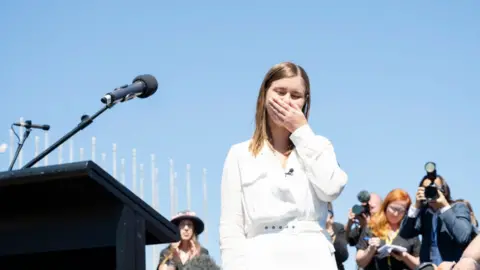 Getty ImagesBrittany Higgins speaking at a March 4 Justice rally in Canberra
Getty ImagesBrittany Higgins speaking at a March 4 Justice rally in Canberra
Though he was not named in the report by journalist Lisa Wilkinson for Network 10 programme The Project, Mr Lehrmann says he was easily identifiable.
Six months later, he was charged by police over the alleged rape. He pleaded not guilty, but his trial in 2022 was aborted after juror misconduct. A retrial was later abandoned out of concerns for Ms Higgins' mental health, and the charges against Mr Lehrmann were dropped.
Seven's Spotlight programme then began chasing Mr Lehrmann, who opted not to give evidence at his criminal trial, for his side of the story.
In the two-part exclusive with the network he said he had no idea how Ms Higgins had ended up naked on a couch in their boss's office, and spoke about the dire impact of the case on his life. The story was later named as a finalist in Australia's top media awards in the Scoop of the Year category.
But before his interview had even aired, Mr Lehrmann launched a defamation lawsuit against Network 10 and Ms Wilkinson, saying the alleged assault never happened and that they "utterly destroyed" his reputation.
Network 10, with Ms Higgins as a witness, said it would defend its report as substantially true.
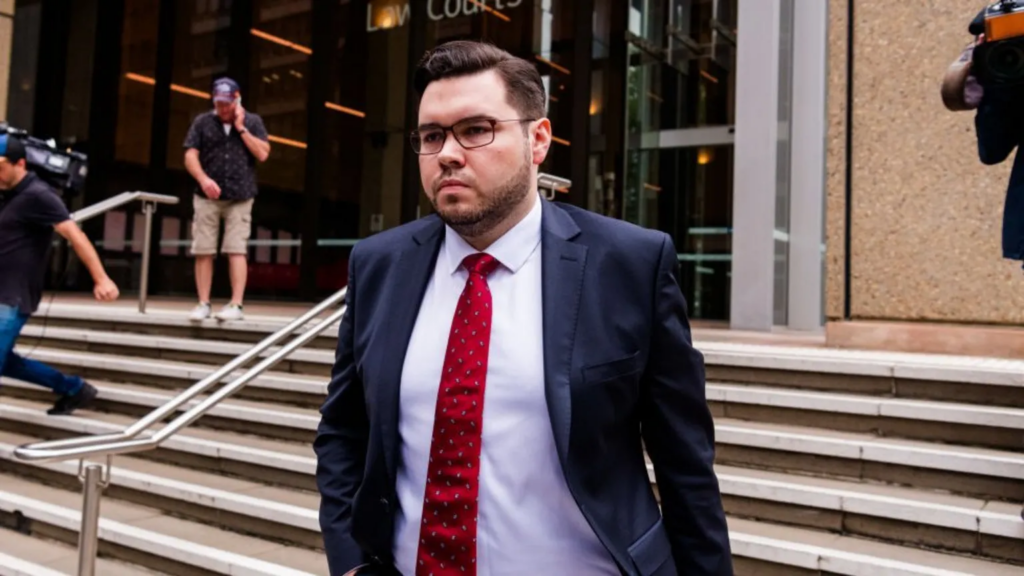
The defamation trial
Defamation cases in Australia have a lower standard of proof than criminal cases and judges often allow reams of seemingly tangential evidence to help them make judgements on the credibility or character of witnesses.
Over five weeks, this trial heard from more than a dozen witnesses who built on evidence given at the criminal one.
Mr Lehrmann took to the witness box this time and Ms Higgins spent several days giving evidence herself. The court also heard analysis from a lip reader flown in from the UK, hours of Ms Wilkinson and her Network 10 colleagues enthusiastically defending their work, and evidence from Mr Lehrmann's ex-colleagues about his "bad vibes".
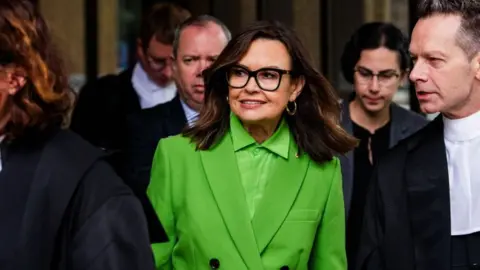 Getty ImagesNetwork 10 journalist Lisa Wilkinson conducted the first interview with Ms Higgins
Getty ImagesNetwork 10 journalist Lisa Wilkinson conducted the first interview with Ms Higgins
But one of the biggest bombshells from the trial concerned the Seven Network.
At the time of its Mr Lehrmann interview, the network said it had "made no payment" to him but had "assisted with accommodation as part of the filming of the story".
But in court, Mr Lehrmann revealed that Seven had agreed to pay his rent for a year, costing the network more than A$100,000 (£52,000; $66,000).
As Seven drew ire and accusations of dishonesty, the Walkley Awards promptly revoked the story's nomination.
Ms Higgins has also accused Mr Lehrmann of leaking her private texts - which she supplied during the police investigation - but he has denied handing any documents to Spotlight.
In criminal trials, prosecutors have to share their evidence with the accused but the defence has an obligation not to use it outside of court.
The fresh evidence
The first rumblings that Seven may have paid Mr Lehrmann more than it had disclosed came weeks ago, amid a completely separate controversy.
Messages that were leaked to the media allegedly showed that a Spotlight producer who was courting Mr Lehrmann for the interview had used a Seven bank card to pay for expensive Thai massages late at night.
Mr Lehrmann dismissed the allegation he had a massage as a "bizarre story from a disgruntled ex-Network Seven producer".
But the producer - Taylor Auerbach - provided more than 2,800 pages of sworn affidavits for Network 10 to use in the defamation case. In these documents, he alleged that Mr Lehrmann was the liar.
In a special hearing convened to test the allegations this week, Mr Auerbach said he charged about A$10,000 in massages to the company card after an evening with Mr Lehrmann. He confessed the charges to his employer the next morning - but he was not sacked - and personally paid them back later.
However, he alleged that Seven had willingly paid for several expensive dinners with Mr Lehrmann, and a golfing trip in Tasmania.
Most explosively, Mr Auerbach said in court that it had also reimbursed Mr Lehrmann for other expenses - including illicit drugs, "prostitutes" and a brothel visit. It is unclear whether Mr Auerbach alleges Seven was aware of the nature of the charges he says it was reimbursing.
Mr Auerbach also rejected Mr Lehrmann's assertions that he had not provided Spotlight with sensitive information such as Ms Higgins' text message history or confidential police documents. Mr Lehrmann turned up to Seven's offices with a massive binder of documents and photocopied more than 500 pages of evidence for the Spotlight episode, Mr Auerbach told the court.
To back up his claims, he pointed to an invoice which showed Mr Lehrmann had billed Seven for vague "pre-production expenses" totalling $750.
And as proof that documents were exchanged, Mr Auerbach cited images taken of a laptop screen showing some of Ms Higgins' texts. In the reflection of the laptop screen, there appears to be a bald man with thick black glasses - which Mr Auerbach says is Mark Llewellyn, Spotlight's executive producer. The metadata of the photo shows it was taken at Mr Lehrmann's accommodation at the time, Mr Auerbach claimed.
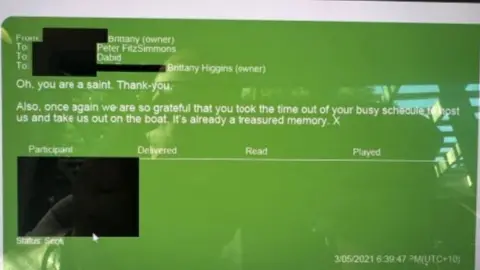 Federal Court of AustraliaOne of the images that Mr Auerbach says proves Seven was given documents
Federal Court of AustraliaOne of the images that Mr Auerbach says proves Seven was given documents
A spokesperson for Seven has said it will not reveal the source of the sensitive evidence it aired in its report, but noted that Mr Lehrmann had denied under oath it was him. And they said Mr Lehrmann had never been reimbursed money allegedly used to pay for illegal drugs or prostitutes.
Lawyers for Mr Lehrmann told the court the same thing.
They played - in slow motion - a bizarre video of Mr Auerbach destroying a colleague's golf clubs, and argued that he had an axe to grind with Seven after his employment was not renewed in 2023.
"You are here today to do as much damage to your former employer and former colleagues as you possibly can... and you're prepared to lie in that endeavour," barrister Matthew Richardson said.
"No, sir," Mr Auerbach replied.
The fallout
Mr Auerbach's evidence has been used to attack Mr Lehrmann's honesty and integrity.
Plus, Network 10 has argued it shows both a contempt of court and an abuse of its processes - requesting the judge consider prosecuting him for that.
Justice Lee has closed the case - for the second time - and is now considering his decision.
But this latest evidence also has big implications for Seven, which was already under fire for its conduct in securing the interview.
Australia's media code of ethics does not ban payment for interviews but it is increasingly frowned upon.
However the code does say that journalists cannot let commercial considerations undermine accuracy, fairness or independence, and that they must disclose when payments have been made.
"If half of this is true... #7spotlight is an absolute disgrace," Paul Barry, host of the Australian Broadcasting Corporation's Media Watch programme, wrote on X.
Mr Auerbach has lost his job as an investigations producer at Sky News Australia over the saga, and another former Spotlight producer has also been sacked from a role as the head of media for New South Wales Police. Many suspect the fallout is likely to escalate.
One report by Sydney's Daily Telegraph claims Seven boss Kerry Stokes is considering cancelling the Spotlight programme - which first aired in 2021 - to limit the damage to the network's brand.
"It does raise questions as to who's in charge at Seven and whether they should still be in charge," Stephen Mayne, a shareholder activist and media commentator, told the Australian Broadcasting Corporation.
Latest Stories
-
Ghana-Russia Centre to run Russian language courses in Ghana
5 hours -
The Hidden Costs of Hunger: How food insecurity undermines mental and physical health in the U.S.
6 hours -
18plus4NDC marks 3rd anniversary with victory celebration in Accra
9 hours -
CREMA workshop highlights collaborative efforts to sustain Akata Lagoon
9 hours -
2024/25 Ghana League: Heart of Lions remain top with win over Basake Holy Stars
10 hours -
Black Queens: Nora Hauptle shares cryptic WAFCON preparation message amid future uncertainty
10 hours -
Re-declaration of parliamentary results affront to our democracy – Joyce Bawah
10 hours -
GPL 2024/25: Vision FC score late to deny Young Apostles third home win
11 hours -
Enhancing community initiatives for coastal resilience: Insights from Keta Lagoon Complex Ramsar Site Workshop
11 hours -
Family Health University College earns a Presidential Charter
11 hours -
GPL 2024/25: Bibiani GoldStars beat Nsoatreman to keep title race alive
11 hours -
GPL 2024/25 Bechem United keep title hopes alive with narrow win over FC Samartex
11 hours -
2024/25: Dauda Saaka scores as Asante Kotoko beat Dreams FC
11 hours -
M.anifest reflects on galamsey’s devastation 11 years after ‘No Shortcut to Heaven’
12 hours -
We’ll have the last laugh – Sammy Gyamfi slams EC’s “cantata” re-collation
12 hours

